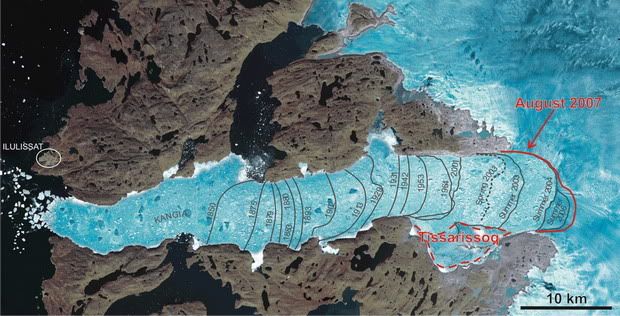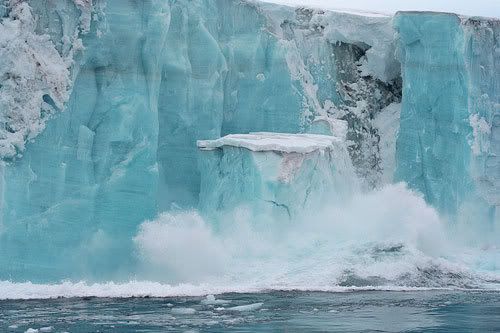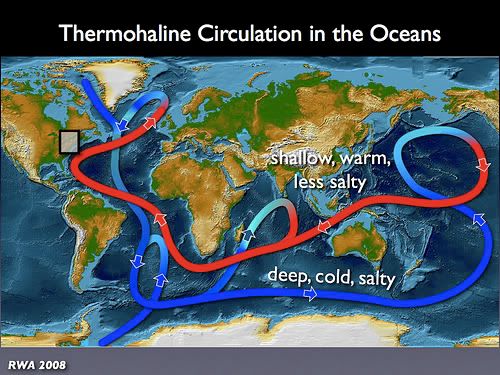Quote:
Originally Posted by mikejet

I know I'm not qualified I was just thinking back to basic chemistry and ice is less dense than water.
|
Density = Mass/Volume = g/mL
Salt Water: 1027Kg/m³ or a density of 1.025 (temperature and salinity at the surface).
Water: Density = 1.0g/mL or 1000Kg/m³ or a density of 1.0 at 4°C.
ICE: Density = about 0.92g/mL or 0.9167g/cm³.
One liter of water has a mass of about one kilogram when measured at about 4 °C so 1 milliliter of water is about 1 g. When water freezes, the molecules form hexagonal crystals that are 9% less dense as a solid then a liquid. When ice melts, the temperature remains constant at 0 °C as it absorbs as much energy as it would take to heat an equivalent mass of water by 80 °C.
Crystal Structure of Ice
Sink or Swim
Ice, like any solid object floats because the buoyancy force is at least equal to the weight of fluid displaced. If the weight of fluid displaced is less then the weight of the object, it will sink. For objects that sink completely the formula is the density of object/density of fluid = weight/(weight - apparent immersed weight)
At any rate, free-floating north pole ice that melts will not raise sea level just as an ice cube floating in a glass of liquid does not raise its level. However, melting Antarctic and Greenland ice sheets that are supported by a land mass will. So how high is sea level expected to rise this century?
Dr. Jeff Masters, comments that according to the IPCC, it will be about 17 to 59cm, which is quite a bit lower then Gore's apocalyptic rise of about 6 meters in the near future. Nevertheless, there is enough ice on both Antarctica and Greenland to raise global sea level by 70m.
Albedo (Whitness)
Melting ice reduces
albedo, the fraction of solar energy reflected back into space - 100% for an ideal white body, 0% for an ideal black body. Frozen ice has an albedo of 80%, where open water is 20%. As sea ice retreats, sunshine that would have been reflected back to space by the bright ice is instead absorbed by the ocean.
96.5 % of the earth's water is in the oceans with 1.7 percent as frozen polar ice. 8.0 % comes from lakes, rivers, wetlands, the ground, and the atmosphere. Should all the ice melt, we will be loosing most of our fresh water reserves. Also, rising sea levels along with over pumped aquifers will cause more salt water to mix with ground water, poisoning the well.
Phase Transition or Latent Heat of Fusion of Water
On earth, water exists as solid, liquid or gas; and its phase transition is from one phase or state of matter to another such as from a liquid state to a solid. As long as solid and liquid coexist, the temperature of the system remains constant and equal to the melting point. Think of ice cubes in a glass of water on a sunny day. As long as there is ice, the rest of the water stays cold and warms up only when all the ice has melted.
The phase transition of ice to water occurs at 0°C and requires 80 cal/g. This is 80 times the amount needed to warm the same mass of water one degree Celsius. The specific heat of Fusion is 334 J g-1. To convert 1 g of ice at 0 ºC to 1 g of water at 0 ºC, 334 J of heat must be absorbed by the water. Conversely, when 1 g of water at 0 ºC freezes to give 1 g of ice at 0 ºC, 334 J of heat will be released to the surroundings.
Greenland
Greenland, Kalaallit Nunaat, is the largest island in the world, lying mainly within the Arctic Circle off northeast Canada. Its
ice sheet (Kalaallisut) has an area of 1,710,000 km² covering 80% of the island. It has an average thickness of 1,500 m (Britannica) and contains about 2.85 million km³ of ice, which is about 8 - 10% of the world's freshwater reserves.
If the icecap on Greenland were to melt, global sea level would rise 7 meters. Current loss of ice is about 25 miles³ per year. This amounts to 1/4 of 1% of it's ice per century; a 100 year total that would add about 70mm to the sea level by 2100. The 25 mi³ per year is small when compared to the 9,500 miles³ of water that evaporates from the oceans and falls on land each year. The oceans themselves have "an area of about 361 million km², an average depth of about 3,730 m, and a total volume of about 1.347 billion km³" (Columbia Encyclopedia). Currently, ice melt from Greenland causes the global sea level to rise about 0.7 mm, which 23% of the yearly total of about 3mm.
Changes in Total Mass of the Greenlan Ice Sheet
Petermann glacier 2010
Greenland's ice melting faster than expected 2:36
video of Greenland melting 3:01
 Sea Ice 101
Sea Ice 101 - NASA 4:29
Arctic Ice Extent- 4 May 2010. April sea ice extent near average; Arctic temperatures above average - 14.69 million square kilometers (5.67 square miles) - nscidc.org
Hiero II of Syracuse and the Golden Crown
http://www.math.nyu.edu/~crorres/Arc...rownIntro.html
http://en.wikipedia.org/wiki/Hiero_II_of_Syracuse
Glossary
Measurements:
- 1 mi² (square mile) = 2.5899 km² (square kilometres)
- 1 mi³ (cubic mile) = 4.16818183 × 10^9 m³ (cubic meter)
- 1 mi³ (cubic mile) = 4.16818183 km³ (cubic kilometer)
Physical Constants for H2O
- Specific heat - 4.18 J/g K
- Molal freezing point depression - 1.86°C/m
- Molal boiling point elevation - 0.52°C/m
- Heat of fusion 79.72 cal/g, 333.6 J/g
- Heat of vaporization - 539.4/g, 2,259 J/g
Albedo - The proportion of light reflected from a surface
Quote:
|
The amount of reflection basically depends on the color of the surface, darker surfaces reflect less than lighter colored ones. For some surfaces, like water, the sun angle affects albedo. If you have been out on a lake during the day you might have noticed that the sun reflects off the surface more when the sun is lower in the sky than it does when it is more directly overhead.
|
Back to
Arctic Sea Ice





































 Linear Mode
Linear Mode

